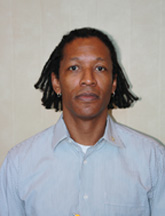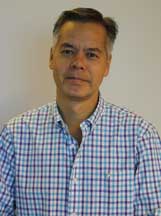Our elected Negotiating Committee works hand-in-hand with our professional negotiators, attorneys and consultants throughout the entire process.
These elected AFA Members are critical to the process because only Flight Attendants know how each of us experiences the provisions of our negotiated Contract. They will work at the direction of the United MEC and in accordance with the priorities set by the AFA Members at United Airlines.
The following AFA Members were elected to our Negotiating Committee:
Jack Kande, IAH Council 42
 After working at another major US airline, Jack emerged as a leader among our ranks even as early as his initial training at United in 1995. In less than a year he was elected by his peers to serve as Local Council President in Hong Kong, where he is currently based. Jack took a break from serving as President of the Local Council after two terms but continued to volunteer on the AFA Grievance, Safety and Occupational Benefits Committees along with acting as Strike Coordinator.
After working at another major US airline, Jack emerged as a leader among our ranks even as early as his initial training at United in 1995. In less than a year he was elected by his peers to serve as Local Council President in Hong Kong, where he is currently based. Jack took a break from serving as President of the Local Council after two terms but continued to volunteer on the AFA Grievance, Safety and Occupational Benefits Committees along with acting as Strike Coordinator.
With encouragement from his flying partners, Jack again ran for Local President in Hong Kong last year and inspired the highest voter turnout for Local Elections across the system even though he was running unopposed. We often hear from Members throughout the system who have flown with Jack and were impressed with his ability to tackle domestic legalities, reserve assignment issues or explain a wide range of our benefits.
In addition to all of his volunteer work for our Union he was an officer in the United States Army Reserves. He also has international Flight Attendant negotiations experience and is schooled as an economist. Jack is well respected by his peers in Hong Kong for his demands for justice and commitment to resolving every issue for the benefit of Flight Attendants. Jack was recently the Chairperson of our Negotiating Committee for our 2012-2016 Contract.
Jack stated to the United Master Executive Council "to me there is no difference between junior/senior, lineholder/reserve or domestic/international issues – there are only issues important to Flight Attendants. I look forward to working with all of my colleagues to achieve the best Contract in the industry."
Kevin Lum, SFO Council 11
 Kevin has distinguished himself with more than 29 years of dedicated service to the Members of our Union. Not one to enjoy the limelight or to be a self promoter of his contributions to our profession, they are numerous and include Local Council work with a focus on Reserve issues and as an alternate to our Central Scheduling Committee. In the 1980’s Kevin was elected by his peers to Vice President and then President of Local Council 11 in San Francisco. His service continued with two terms as the President of the United Master Executive Council beginning in 1993. Additionally, he has served as a member of the AFA Negotiations Policy Committee, and our International Committee of the AFA Board of Directors.
Kevin has distinguished himself with more than 29 years of dedicated service to the Members of our Union. Not one to enjoy the limelight or to be a self promoter of his contributions to our profession, they are numerous and include Local Council work with a focus on Reserve issues and as an alternate to our Central Scheduling Committee. In the 1980’s Kevin was elected by his peers to Vice President and then President of Local Council 11 in San Francisco. His service continued with two terms as the President of the United Master Executive Council beginning in 1993. Additionally, he has served as a member of the AFA Negotiations Policy Committee, and our International Committee of the AFA Board of Directors.
His experience as the President of the United Master Executive Council during another period of corporate change, and his strategic thinking as a negotiator set AFA apart from other workgroups during the Employee Stock Ownership (ESOP) negotiations and will serve us well in our upcoming negotiations. Critical thinking and decision making proved pivotal in protecting our profession during his term in office. For example, in order for Flight Attendants to participate in the ESOP at United Airlines, Flight Attendants would have been required to agree to the concessions like the other workers at United Airlines. This would have generated the money to buy the airline. The value of those concessions would then secure financing to purchase the airline through a leveraged buyout and the stock would be reissued to employees through an Employee Stock Ownership Plan. During the ESOP related negotiations it was determined that Flight Attendant participation in the Employee Stock Ownership Plan would have required devastating concessions on the part of Flight Attendants. Bucking the corporation, AFA refused to go along. As a result, Flight Attendants ended up ahead by hundreds of millions of dollars in what proved to be nevertheless an oft cited Collective Bargaining Agreement.
The ESOP negotiations, and ultimately the decision to not participate in the Employee Stock Ownership Plan (ESOP) proved to be pivotal in protecting Flight Attendant interests when United Airlines entered into bankruptcy in 2002 erasing millions of dollars of contributions made by other workers.
Kevin’s testimony in City Council hearings in San Francisco when United Airlines refused to comply with a domestic partnership ordinance proved invaluable in moving United Airlines into the acceptance and recognition of domestic partner benefits across the industry. During his interview with the United Master Executive Council it was evident that he is a long time AFA activist, with a unique skill set, and most importantly, the experience needed to accomplish the work ahead. Kevin stated, “the United Airlines Flight Attendant Contract is historic both in its breadth and longevity. Stretching back to the beginning of commercial aviation in the United States, our Contract has pioneered wages, benefits and working conditions for Flight Attendants at United and across the industry.” When viewed in this light, Kevin recognizes that, “the coming negotiations are one of the most critical we have ever faced here at United and throughout the industry.” Kevin’s steely determination and “no non-sense” approach will serve us well during Joint Contract Negotiations.
As impressive as the credentials are for our negotiators remember that the real negotiations take place in the field every day. You are the key to the success of our negotiations. Ask yourself: what are you willing to fight for? Throughout this process our Union will conduct Member trainings and provide a constant stream of communications. All of us will play a critical role in our future success and that begins with a fundamental understanding of the process. Together we will be prepared and able to send our negotiators to the table with the full power of solidarity squarely behind them.